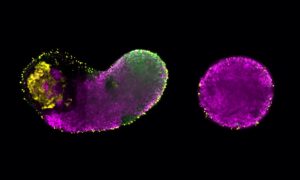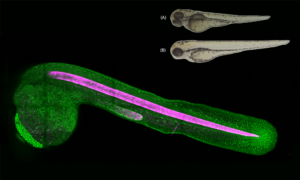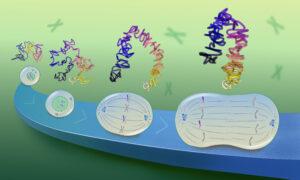Small code change, big effect
Using synthetic biology to label proteins precisely
Scientists at the European Molecular Biology Laboratory (EMBL) in Heidelberg, Germany, have developed a new method which enables researchers to label any protein of their choice with any of a wide variety of previously available compounds, in living cells, by introducing a single reactive artificial amino acid. Published today in Angewandte Chemie, the new technique enables researchers to label even rare proteins very precisely for optical imaging and in the future likely also for Magnetic Resonance Imaging (MRI).
Carsten Schultz, Edward Lemke and colleagues tricked the cell’s protein-synthesising machinery into replacing one of the protein’s building blocks – amino acids – with an artificial amino acid variety that is suitable for performing biocompatible chemical reactions. This artificial amino acid was tailor-made by the EMBL scientists to ensure that the cell’s spell-checking machinery couldn’t detect it, and once it had been incorporated into the protein of interest, it acted as a loading site to which different labels can be attached, in what is called a catalyst-free ‘click’ reaction.
This novel technique has several advantages. It allows researchers to use the most efficient fluorescent dyes, enabling high-contrast fluorescence microscopy. And, as it involves changing only one of the hundreds of amino acids that typically make up a protein, it causes much less disturbance to the cell than previous approaches, which depended on introducing much larger molecules.
Schultz, Lemke and colleagues engineered the ‘click’ reaction so that it is the act of binding to it that turns on a fluorescent label. This ensures very precise measurements, as there is little background signal from unattached dye.
Having developed this method initially in the bacterium E. coli, the EMBL scientists are now working on implementing it in mammalian cells like our own.



